DECADES-OLD PRACTICE MAY PLACE “INDUSTRY” IN JEOPARDY
by Sharon Rondeau

(Dec. 7, 2016) — On Sunday, The Post & Email published an article reporting on the use of “stacks” and chains on some Tennessee Walking Horses during competition, a practice begun in the 1940s which, although outlawed, continues today, particularly in the South.
The Horse Protection Act of 1970 was intended to stop “soring,” a process involving painful chemicals applied to the lower legs to cause the horse to step higher to win prizes at exhibitions.
On Wednesday, an activist group sponsoring a petition to Tennessee Department of Agriculture Commissioner Jai Templeton and Gov. Bill Haslam asks that taxpayer dollars not be infused into a renewed effort to allegedly preserve the “Big Lick” Tennessee Walking Horse performance style which reportedly is a product of soring.
The new initiative was dubbed “Project Pegasus” by the Tennessee Walking Horse Breeders’ and Exhibitors” Association (TWHBEA) last February when plans for it were announced.
The petition will be delivered to Templeton and Haslam on Thursday.
Some breeders, trainers and owners of the Tennessee Walking Horse are at odds with the US Department of Agriculture’s announced plans to ostensibly tighten regulations stemming from the Horse Protection Act, which prohibits the participation in competitions of any horse determined by a USDA “qualified” inspector to be “sore.” “Industry” leaders want to develop a “science-based” method by which horse would be deemed sound or unsound to compete.
Prior to shows, USDA inspectors look for signs of banned chemical agents or scars on the horse’s pasterns. However, inspectors appear at only a small percentage of horse shows, particularly those involving the Tennessee Walking Horse and similar breeds prized for their unique gaits.
For more than a week, The Post & Email has attempted to reach various parties at the TWHBEA to ask the organization’s position on soring and the use of “stacks” and chains in contests. However, thus far, we have received no response to a voice message and three emails.
The Humane Society and other organizations have characterized the “Big Lick” as animal cruelty. Neither of two bills introduced in Congress in 2014 to curb the practice passed, and a bill introduced the following year by New Hampshire Sen. Kelly Ayotte met the same fate.
Ayotte narrowly lost her bid for re-election last month to Democrat Maggie Hassan.
On Monday, a member of the change.org group CCABLAC told The Post & Email, “‘The Horse Protection Act went through in the 70’s. People have been fighting Soring ever since to no avail. Yes, this abuse is deeply ingrained in a small group of show people, breeders, farriers, and vets. So it has been dubbed ‘a culture of cruelty’.”
According to USA Today when the bills were introduced:
The stakes are high. Although popular across the nation, the industry is centered in its namesake state and in neighboring Kentucky.
Shelbyville, Tenn., about 60 miles southeast of Nashville, hosts the national celebration and the breed means millions of dollars to the local economy.
Tennessee walking horses have a naturally high gait, giving riders less bounce. The high step serves as a natural shock absorber.
Over the years, trainers have used special shoes and metal chains to encourage a higher step. Eventually, some figured out that the training could go faster if they abused horse’s hooves and ankles — the practice known as soring.
In its February press release, the TWHBEA stated that the money to fund Project Pegasus will be raised privately.
Soring was reported on by Maury Povich in 1987 in which his guest presented a groom who admitted to performing the techniques on horses for 15 years.
The HPA of 1970 allowed for inspections at a small number of horse shows prior to competition. However, a veterinarian interviewed for the Povich show said that despite USDA-trained inspectors, “you can…train the horse to not react to the inspection test.”
According to the website www.billygoboy.com, Tennessee Sen. Lamar Alexander; his campaign finance chairman, Steve Smith; and former Senate Majority Leader Dr. Bill Frist are proponents of the “Big Lick.” Smith has reportedly received a citation, or “ticket,” from a USDA-designated inspector for a “sore” or otherwise disqualified horse and served as chairman of the TWHBEA.
Billygoboy further reports that Kentucky Sen. Mitch McConnell has received $750,000 “from Big Lick interests” over the last 28 years in which he has been in Congress, a claim The Post & Email has not independently confirmed.
According to the same source, attendance at and support for “Big Lick” horse shows has dropped dramatically in Mississippi and Tennessee over the last 16 months in which he and other activists have brought attention to the “Big Lick.”
A video on billygoboy’s Facebook page depicts an alleged former “Big Lick” trainer “preparing” a horse to pass inspection which had been sored.
TWH industry leaders say that the USDA’s inspectors conduct “subjective” testing on the horses which is not necessarily accurate.
Of its three main goals, the TWHBEA states that it is seeking to exhibit only horses which are “safe, sound, and healthy” as well as “to guarantee a scientifically objective, fair, predictable, and accurate pre-show inspection.”
The “final objective” of Project Pegasus is stated as “a healthy and vibrant show circuit.”
On Monday, The Post & Email sent a message to the contact person listed on the TWHBEA press release, Tim Blankenship, which reads:
On Wednesday, we sent a second email to the same address:
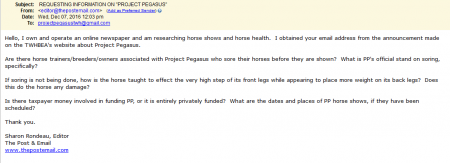 and thus far have received no response.
and thus far have received no response.
On Wednesday, The Post & Email contacted the Tennessee Department of Agriculture to ask its position on the claim that taxpayer dollars reportedly could be used for Project Pegasus:
We later received the following response from DPA spokesperson Christine Gould:
On his blog, billygoboy claims that Templeton “denied that he “announced a grant” to assist TWHBEA with “Project Pegasus” at the TWHBEA Award Banquet held last Friday, Dec. 2, 2016, at the Franklin Marriott Hotel” (emphasis his).
After working hours on Wednesday, The Post & Email responded to Gould with several more questions.
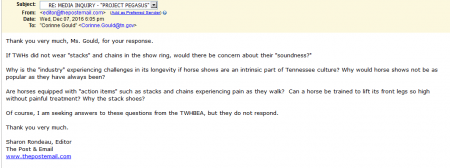 The Post & Email will report Gould’s response in a subsequent article.
The Post & Email will report Gould’s response in a subsequent article.

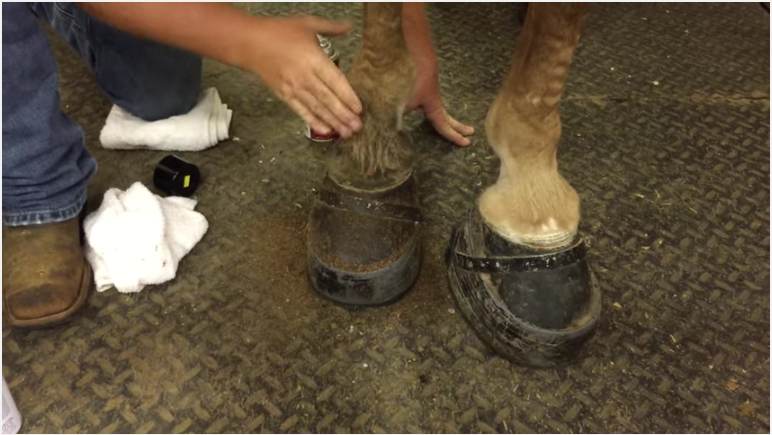

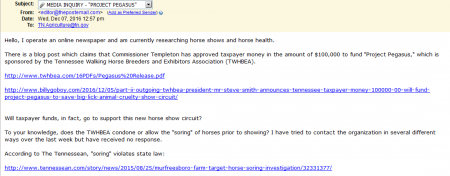

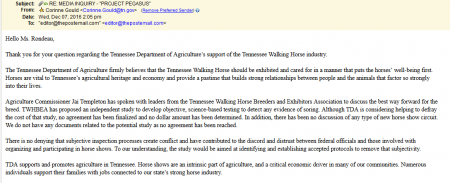

Thank you Sharon for publishing this. I was appalled when I saw the video and very disgusted about the inhumane treatment of these horses. This method must be outlawed and only someone like you can shed the light on the practice. Again thank you.